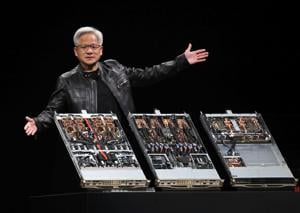
Nvidia’s CEO, Jensen Huang, announced that the U.S. government has granted approval for the company to sell its advanced H20 computer chips, essential for artificial intelligence development, to China. This significant development was shared in a company blog post on Monday and also during an interview on China’s state-run CGTN television network. Huang stated that Nvidia expects to start deliveries soon, following the U.S. government’s assurance that licenses will be issued for this sale.
In his remarks to reporters in Beijing, Huang highlighted the importance of maintaining competitive access to the Chinese market, noting that half of the world’s AI researchers are based in China. “It’s so innovative and dynamic here in China that it’s really important that American companies are able to compete and serve the market here,” he said. His comments followed a meeting with former President Donald Trump and other U.S. policymakers aimed at discussing the challenges and opportunities in the technology sector.
Impact of U.S.-China Relations on Technology Sales
Huang’s visit to China coincided with the China International Supply Chain Expo, where Nvidia is an exhibitor. During his time there, he met with Ren Hongbin, the head of the China Council for Promotion of International Trade. This meeting underscores the ongoing dialogue between U.S. technology firms and Chinese officials, particularly in light of the strained trade relationship between the two countries.
Nvidia has seen substantial profits from the surging interest in AI technologies, recently achieving a market valuation exceeding $4 trillion. However, the ongoing U.S.-China trade rivalry has introduced significant uncertainties. The U.S. government has imposed tighter controls on advanced technology exports to China, citing national security concerns that civilian technology could be repurposed for military uses. The emergence of China’s DeepSeek AI chatbot earlier this year intensified worries regarding the risk of advanced chips being utilized to bolster China’s AI capabilities.
In January, shortly before Trump’s second term commenced, the Biden administration unveiled a framework aimed at regulating the export of advanced computer chips, balancing national security issues with the economic interests of technology producers. In April 2023, the White House announced restrictions on sales of Nvidia’s H20 chips and AMD’s MI308 chips to China, which Nvidia estimated could cost the company an additional $5.5 billion in lost revenue.
Nvidia’s Future in the Global AI Market
Huang and other technology industry leaders have been actively lobbying for the reversal of these restrictions, arguing that they hinder U.S. competitiveness in a crucial sector within one of the world’s largest technology markets. They caution that stringent export controls may inadvertently drive other countries towards adopting Chinese AI technologies.
Following the announcement of the licensing approval, Nvidia’s stock experienced a nearly 5% increase before the market opened, reflecting investor optimism about the potential for renewed business opportunities in China. As the global landscape for AI technology continues to evolve, Nvidia’s strategic maneuvering will be closely watched by industry stakeholders and investors alike.







